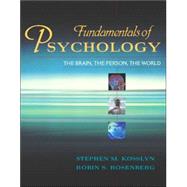
What is included with this book?
All chapters begin with “Chapter Outline” and conclude with “A Deeper Level: Recap and Thought Questions.”
Using Psychology to Learn Psychology.
Organization, Organization, Organization.
Connections Across Topics.
Learning Without Straining.
Illustrations: Showing and Telling.
In Sum...
1. The Science of Psychology: Yesterday and Today.
Psychological Science: Getting to Know You.
Psychology Then and Now.
The Science of Psychology: Designed to Be Valid.
2. The Brain: The Psychological Organ.
Brain Circuits: Making Connections.
The Nervous System: An Orchestra with Many Members.
Probing the Brain.
Genes, Brain, and Environment: The Brain in the World.
3. Sensation and Perception: How the World Enters the Mind.
Sensing and Selecting: Opening Up to the World.
Vision.
Hearing.
Sensing in Other Ways.
4. Learning.
Classical Conditioning.
Operant Conditioning.
Cognitive and Social Learning.
5. Memory: Living with Yesterday.
Memory: A Many-Splendored Thing.
Encoding and Retrieving Information from Memory.
Fact, Fiction, and Forgetting: When Memory Goes Wrong.
Improving Memory: Tricks and Tools.
6. Language, Thinking, and Intelligence.
Language: More Than Meets the Ear.
Foundations of Thought.
Logic, Reasoning, and Decision Making.
Is There More Than One Way to Be Smart?
What Makes Us Smart: Nature and Nurture.
7. Emotion and Motivation: Feeling and Striving.
Emotion: I Feel, Therefore I Am.
Motivation and Reward: Feeling Good.
Hunger and Eating: Not Just About Fueling the Body.
Sex: Not Just About Having Babies.
8. Personality: Vive La Difference!
What Is Personality?
The Brain: The Personality Organ.
The Person: Beliefs and Behaviors.
The World: Social Influences on Personality.
9. Psychology over the Lifespan: Growing Up, Growing Older, Growing Wiser.
In the Beginning: From Conception to Birth.
Infancy and Childhood: Taking Off.
Adolescence: Between Two Worlds.
Adulthood and Aging: The Continuously Changing Self.
10. Stress, Health, and Coping.
What Is Stress?
Stress, Disease, and Health.
Strategies for Coping.
11. Psychological Disorders.
Identifying Disorders: What's Abnormal?
Anxiety and Mood Disorders.
Schizophrenia.
Other Axis I Disorders: Dissociative and Eating Disorders.
A Cautionary Note About Diagnosis.
12. Treatment.
Insight-Oriented Therapies.
Behavior and Cognitive Therapy.
Biomedical Therapies.
Which Therapy Works Best?
13. Social Psychology: Meeting of the Minds.
Social Cognition: Thinking about People.
Social Behavior: Interacting with People.
A Final Word: Ethics and Social Psychology.
Appendix A: Statistics.
Appendix B: How to Read, Critically Evaluate, and Write Research Papers.
References.
Glossary.
Name Index.
Subject Index.
Credits.
The New copy of this book will include any supplemental materials advertised. Please check the title of the book to determine if it should include any access cards, study guides, lab manuals, CDs, etc.
The Used, Rental and eBook copies of this book are not guaranteed to include any supplemental materials. Typically, only the book itself is included. This is true even if the title states it includes any access cards, study guides, lab manuals, CDs, etc.